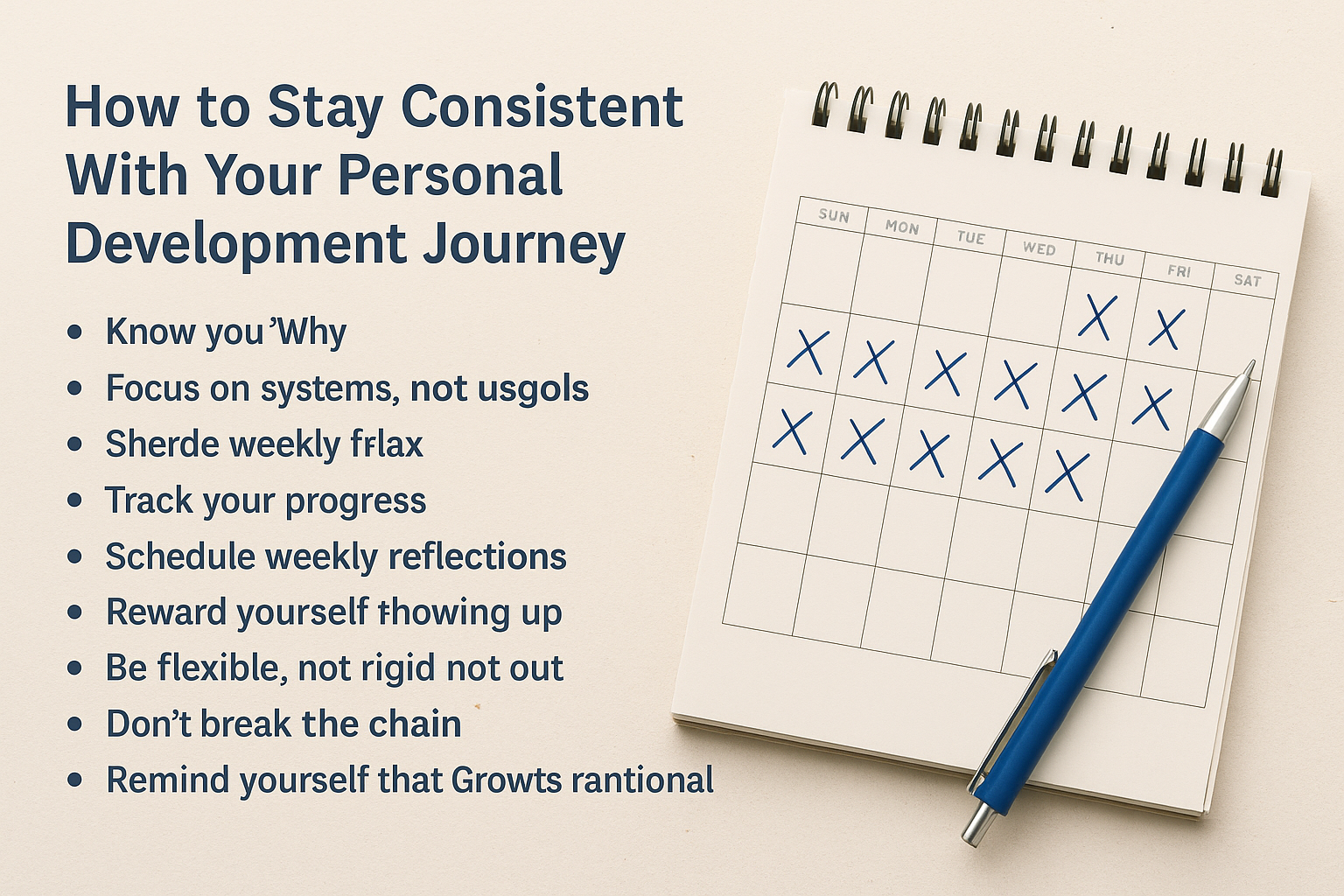Personal development isn’t something you do once and check off a list—it’s a lifelong journey. But staying consistent can be hard. Life gets busy, motivation fades, and old habits creep back in.
In this article, you’ll learn practical ways to stay committed to your growth, even when things feel slow, boring, or challenging.
Why Consistency Matters More Than Intensity
It’s not the occasional big effort that shapes your future—it’s what you do consistently.
- Reading 10 pages a day beats reading 100 once a month
- Stretching for 5 minutes daily is better than 1 intense workout per week
- Reflecting for 10 minutes each night brings more clarity than a once-a-year retreat
Consistency builds momentum, resilience, and long-term transformation.
1. Know Your “Why”
Before you commit to a habit or goal, ask:
- Why does this matter to me?
- Who am I becoming through this practice?
- What do I gain by sticking with this?
When your “why” is clear, you’ll stay anchored during difficult days.
2. Focus on Systems, Not Just Goals
Goals give you direction. Systems give you structure.
Example:
- Goal: “I want to journal daily.”
- System: “Every night at 9 PM, I’ll write one page before bed.”
Build habits into your day like appointments. The system does the heavy lifting.
3. Lower the Bar (But Don’t Quit)
You won’t always have the time, energy, or motivation. That’s okay.
Create a minimum version of your habit for hard days:
- No time to work out? Do 10 squats.
- Too tired to read? Read 1 paragraph.
- Can’t meditate for 10 minutes? Breathe deeply for 30 seconds.
The goal is to keep the habit alive, even in small doses.
4. Track Your Progress Visually
Use a habit tracker, calendar, or app to check off each day you follow through.
Visual streaks:
- Boost motivation
- Build self-trust
- Make progress tangible
Don’t aim for perfection. Aim for showing up.
5. Schedule Weekly Reflections
Consistency doesn’t mean blind repetition. Take time to adjust and realign.
Each week, ask:
- What worked well?
- What was challenging?
- What do I want to change for next week?
Reflection turns motion into meaningful growth.
6. Use Accountability
Share your goals with someone:
- A friend or mentor
- An online group
- A coach or accountability buddy
Knowing someone else is aware of your commitment adds structure and encouragement.
7. Reward Yourself for Showing Up
Positive reinforcement works.
Celebrate:
- Finishing a week of consistent journaling
- Sticking to your habit during a busy time
- Taking action when you didn’t feel like it
Rewards can be small: a favorite treat, a relaxing walk, or just saying, “I’m proud of me.”
8. Be Flexible, Not Rigid
Life changes. You’ll get sick, travel, face stress. That’s normal.
Adapt your system when needed:
- Change your habit time or location
- Adjust the difficulty
- Temporarily reduce frequency
Flexibility keeps your habit alive through real-life challenges.
9. Don’t Break the Chain (If You Do, Restart Fast)
Try the “Don’t break the chain” method:
- Put an X on your calendar every time you complete your habit
- Aim for an unbroken chain of Xs
- If you miss a day, restart immediately—don’t wait for Monday
One missed day is a slip. Two in a row becomes a pattern.
10. Remind Yourself That Growth Is Nonlinear
There will be:
- Highs and lows
- Motivation and resistance
- Breakthroughs and setbacks
This is normal. Progress is not a straight line—it’s a cycle. Stay the course, and you’ll keep rising.
Keep Showing Up—Even When It’s Boring
The real power of personal development comes not from how much you do, but from how often you return to it.
Try this:
- Choose one area you want to grow in
- Set a simple, daily habit for it
- Stick to it for 7 days—no matter what
- Reflect on how it feels
Consistency isn’t glamorous—but it’s transformational. Show up for yourself. You’re worth the effort.
